译林版八年级下册英语Unit 2 Reading知识点总结
牛津译林版八年级下册Unit2 Reading1同步课时练习(有答案)
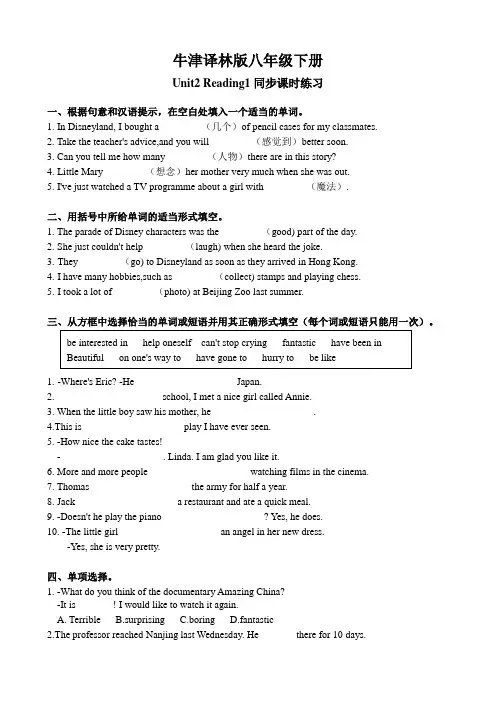
牛津译林版八年级下册Unit2 Reading1同步课时练习一、根据句意和汉语提示,在空白处填入一个适当的单词。
1. In Disneyland, I bought a ________(几个)of pencil cases for my classmates.2. Take the teacher's advice,and you will ________(感觉到)better soon.3. Can you tell me how many ________(人物)there are in this story?4. Little Mary ________(想念)her mother very much when she was out.5. I've just watched a TV programme about a girl with ________(魔法).二、用括号中所给单词的适当形式填空。
1. The parade of Disney characters was the ________(good) part of the day.2. She just couldn't help ________(laugh) when she heard the joke.3.They ________(go) to Disneyland as soon as they arrived in Hong Kong.4.I have many hobbies,such as ________(collect) stamps and playing chess.5.I took a lot of ________(photo) at Beijing Zoo last summer.三、从方框中选择恰当的单词或短语并用其正确形式填空(每个词或短语只能用一次)。
1.-Where's Eric? -He ____________________Japan.2.____________________school, I met a nice girl called Annie.3. When the little boy saw his mother, he ____________________.4.This is ____________________play I have ever seen.5. -How nice the cake tastes!- ____________________. Linda. I am glad you like it.6. More and more people ____________________watching films in the cinema.7. Thomas ____________________the army for half a year.8. Jack ____________________a restaurant and ate a quick meal.9. -Doesn't he play the piano ____________________? Yes, he does.10. -The little girl ____________________an angel in her new dress.-Yes, she is very pretty.四、单项选择。
牛津译林版英语八年级下册Unit 2 Reading(Ⅱ)课时练习
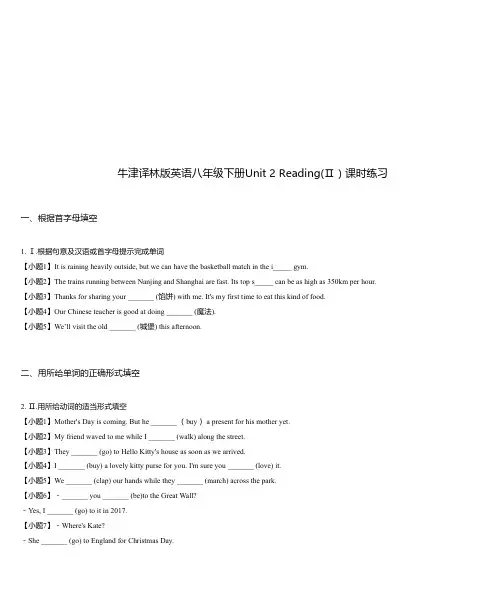
牛津译林版英语八年级下册Unit 2 Reading(Ⅱ)课时练习一、根据首字母填空1. Ⅰ.根据句意及汉语或首字母提示完成单词【小题1】It is raining heavily outside, but we can have the basketball match in the i_____ gym.【小题2】The trains running between Nanjing and Shanghai are fast. Its top s_____ can be as high as 350km per hour.【小题3】Thanks for sharing your _______ (馅饼) with me. It's my first time to eat this kind of food.【小题4】Our Chinese teacher is good at doing _______ (魔法).【小题5】We’ll visit the old _______ (城堡) this afternoon.二、用所给单词的正确形式填空2. Ⅱ.用所给动词的适当形式填空【小题1】Mother's Day is coming. But he _______ (buy) a present for his mother yet.【小题2】My friend waved to me while I _______ (walk) along the street.【小题3】They _______ (go) to Hello Kitty's house as soon as we arrived.【小题4】I _______ (buy) a lovely kitty purse for you. I'm sure you _______ (love) it.【小题5】We _______ (clap) our hands while they _______ (march) across the park.【小题6】-_______ you _______ (be)to the Great Wall?-Yes, I _______ (go) to it in 2017.【小题7】-Where's Kate?-She _______ (go) to England for Christmas Day.三、其他【小题8】-_______ you _______ (pack) everything?-Not yet.3. Ⅲ.根据句意,用适当的介词填空,使句子完整、通顺【小题1】How did you feel _______ the whole ride?【小题2】I haven' t heard from you _______ last week.【小题3】We’ve been in Hong Kong Disneyland _______ about six hours.【小题4】When did you buy presents _______ your parents in Beijing?【小题5】Can tourists take photos _______ those Disney characters?【小题6】We felt very tired _______ the end of the day.【小题7】They had a talk later _______ the afternoon.【小题8】The tall building looked beautiful _______ the fireworks.【小题8】你最后观看了烟火吗?We __________________at the Great Wall.【小题7】我们在长城拍了一些照片。
译林版八年级下册英语Unnit 2 第2课时 reading
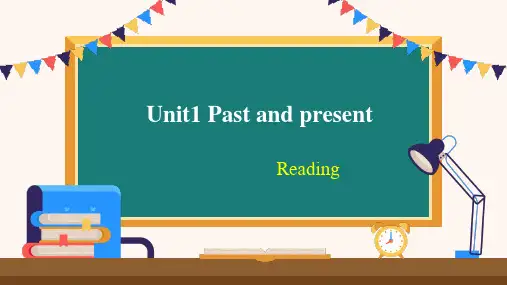
years/since ten years ago.
5. Has the town changed a lot over the years? 近几年间这个城镇变化大吗? a lot 副词短语,“很,非常”,常修饰动词、感叹词或形容词/副词的比较 级等,在句中作程度状语。 a lot意为“许多,大量”,在句中作主语、宾语或表语,其后可有动词不定 式短语作后置定语。 a lot of = lots of,意为“许多的,大量的”,都可修饰可数名词复数或不可 数名词。 over the years“在这几年间” over “在……期间” = during, throughout
lead in
创作画廊主题
Lorem ipsum dolor sit amet, consectetuer adipiscing elit
Times have changed
Millie is telling Sandy about her interview with Mr. Chen. Sandy does not know the meanings of some words. Help her match the words on the left with the meanings on the right. Write the correct letters in the blanks.
impossible
6. Amazing changes have taken place in Sunshine Town. T
宋世生八年级英语下册 Unit2 reading(1)教案 牛津译林版
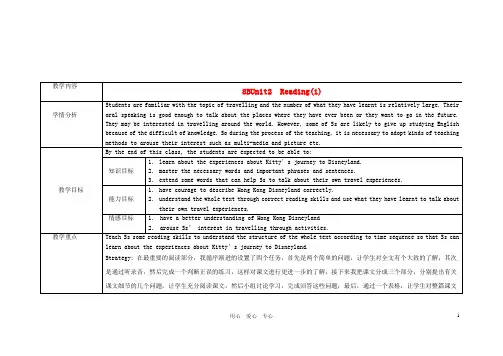
comprehension
Task1:Fast-reading .
Task2: “T”or“F”
Task3: reading for details.
Task4:post-reading
Step5:
Group work.
Step6:Homework
Ask two questions about the text
(The parade of Disney characters.)
(5)What did they buy as souvenirs?
(Some stationery, a beautiful purse and apretty hair clip.
Ask the Ss to work in groups of four and fill in the form.(8min)
Answer questions put forward by teacher.
Ask them whether they have ever been toHong Kong; What they know about Disney and if they want to go there.(2min)
(The whale fountain.)
(3)Why couldn't Kitty stop taking photos with Disney characters?
(Becausethey all looked nice and cute.)
(4)What was the best part of the day?
3.Ask Ss to do exercises B2 on page28.(3min)
Unit2知识点和考点2021-2022学年牛津译林版八年级英语下册
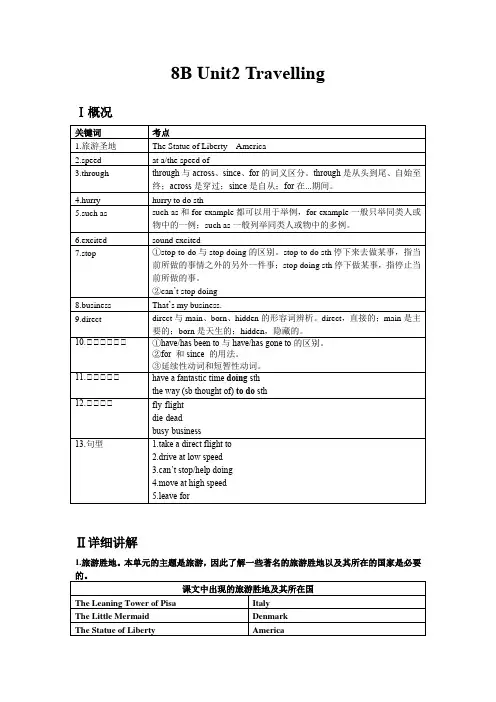
8B Unit2 TravellingⅠ概况Ⅱ详细讲解1.旅游胜地。
本单元的主题是旅游,因此了解一些著名的旅游胜地以及其所在的国家是必要【2020年五中】I will go on a trip to the USA to visit ______ this summer holiday.A. the Sydney Opera HouseB. the Little MermaidC. Tower BridgeD. the Statue of Liberty答案DI miss you so much.21.【2022年树中】—Is anything worth seeing in Nanjing?—Yes. Don’t __________ Zhongshan Mountain National Park with lots of cultural relics and natural beauty.A.forgetB. missC. avoidD. prevent答案BWe’re having a fantastic time here.【2022年十二】10. great fun it is to fly kites! fantastic time the children are having!A. What; What aB. What; WhatC. How; How aD. What a; What【答案】A2.It moved at high speed and was really exciting.(1)speed的基本含义作名词,意思是速度(2)speed的核心考点,考察speed的固定搭配at a/the speed of,以...样的速度,介词用at,speed前用冠词。
而搭配at high speed中没有冠词。
2. The train is running the speed of 200 kilometers per hour.A. withB. atC. inD. for答案B3.We were screaming and laughing through the ride.(1)through的基本含义作介词,意思是从头到尾,自始至终(2)through的核心考点考察through与across、since、for的词义区分。
牛津译林版英语八年级下册Unit2 Reading2 课件
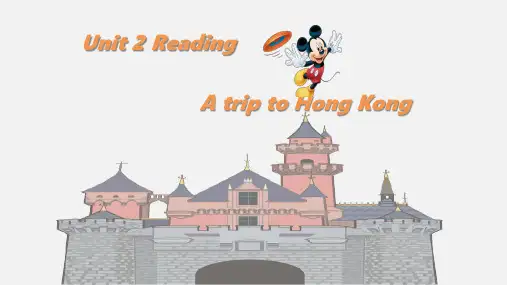
Next, they hurried to a restaurant _t_o__h_a_v_e_a__q_u_i_ck__m__e_a_l. On the way, they met _so__m_e__D_i_s_n_e_y_c_a_r_t_o_o_n_c_h_a__ra_c_t_e_r_s_.
3. We’re having a fantastic time here. have a good/great/wonderful/nice time
= have fun = enjoy oneself 过得愉快,玩得开心 have a good time/have fun + doing sth. 做某事很开心 have a difficult time doing sth. 做某事很困难
What did they do at Disneyland?
Later in the afternoon, they sawa_p_a_r_a_d_e_o_f_D_i_sn_e_y_c_h_a_r_a_ct_e_r.s After the parade, they watched _a_4_-_D_f_il_m__.
UNIT2第2课时READING八年级英语下册课后培优分级练(牛津译林版)
Unit 2 Travelling第2课时Reading单词检测 1. _______________ adj.极好的 2. _______________adj.室内的3. _______________ n. 速度4. _______________ n. 乘坐5. _______________ n. 卡通片6. _______________ n. 人物7. _______________pron.这样的8. _______________ n. 游行9.________________n.魔法10. _______________ n. 派11._______________ vt.感觉到12._______________n. 两个人13._______________ n. 城堡短语自测 1. ___________________________ 香港之旅2. ___________________________ 在寒假期间3. ___________________________ 乘地铁4. ___________________________ 高速移动5. ___________________________ 匆忙去餐馆6. ___________________________ 例如7. ___________________________ 忍不住一直拍照片8. ___________________________ 玩得开心9. ___________________________ 几个钥匙扣10. ___________________________ 在一天结束时重点句子1、我跟着他们跑,忍不住一直拍照片。
_____________________________________________________________2、我给同学们买了几个钥匙环。
八年级英语译林版下册Unit2_Reading_释疑点拨
Unit2 Reading释疑点拨1.have been in意为“待在某地”,常和一段时间连用。
如:My grandfather has been in the village for fifty years.我爷爷已经在这个村子待了五十年了。
2.spend是及物动词,句型spend… on sth. 意为“在…花费(时间、金钱等)”和spend…(in) doing sth.意为“做某事花费(时间、金钱等)”。
如:He spends a lot of money (in ) buying books.他花很多钱买书★其它的几种花费:sth. +cost sb. (some money) ;sb. +pay (money) for sth.;It +takes sb. (some time) to do sth. 如:The pen costs me five dollars. 这只钢笔花费我五美元。
I pay the flowers for twenty dollars. 我花20美元买了这束花。
It takes me three hours to finish the work. 完成这项工作花费了我三个小时。
3.whole作形容词,意为“全部的,整体的”。
如:You should work with your whole Heart.你应该全身心地工作。
ugh是不及物动词,意为“笑,大笑”。
常见的短语有laugh at sb嘲笑某人;laugh to sb对某人大笑;laugh oneself to death笑得要死;laugh over因……而发笑。
如:He laughs best who laughs last.谁笑到最后,谁笑得最好。
★此外laugh还可作名词,表示“笑,笑声”,是可数名词。
give a laugh 大笑一声5. hurry to do sth. 意为“赶快做某事”。
2020年春牛津译林版英语八年级下册— Unit2知识点梳理
Unit 2 Travelling2.1 Comic strip & Welcome to the unit1. fantasticadj.意为“极好的,美妙的”。
have a fantastic time=have a good/great/wonderful time玩得开心。
fantasy n.幻想,想象。
2. such det.& pron.such意为“这样的(人或物)”,常用于以下结构:such+a/an+adj.+可数名词单数。
如:This is such a big house.这是一座如此大的房子。
such+adj.+可数名词复数。
如:They are such kind girls.她们是如此好心的女孩。
such+adj.+不可数名词。
如:It is such sad music.它是如此悲伤的音乐。
【辨析】so常用于以下结构:so+adj.+a/an+可数名词单数。
如:so clever a boy如此聪明的一个男孩so+adj./adv.。
如:so clever如此聪明;so quickly如此迅速so many/much/few/little+n.。
如:so many mistakes如此多的错误3. couple n.意为“两人,两件事物,几个人”。
a couple of…一对,几个,几件。
I saw a couple of men get out我看见有两个男人出去了。
We went there a couple of years ago.我们几年前去过那儿。
4. --- Hey, Eddie.Where are you going? 嘿,埃迪。
你要去哪儿?---I'm going to South Hill for my holiday.我要去南山度假。
这两句都表示将要做某事,一般用将来时态,但因为句中的动词是go,所以可用现在进行时表示将来的概念。
Unit 8 第2课时 Reading-八年级英语下册(牛津译林版)
思维品质 思考如何才能做到可再生资源和循环利
用资源,节约能源
文化意识 作为社会中的一员,作为学生的我们如
何宣扬环境保护意识
Do you know what causes the following pollution?
air pollution
water pollution
What is the result of பைடு நூலகம்his?
There are also laws to limit air and water pollution. ④Nature is our greatest treasure.We depend on its
rich resources to live, so it is important for us to protect
argumentation
论点、论据、论证
exposition description
书信、申请书、邮件、布告通告、海报 等
说明对象、说明对象特征、说明语言、 说明方法、说明顺序、说明结构
It can help us get the main the idea easily.
Intr①odIucloeve Switzerland. It is a country with high mountains and cleaSnwbiltuzeerlalakensd. Iits ias bbeeaauutitfuifl,uland we should try to keep it that way. country.
It causes people illness. global warming ...
It causes animals death. water shortages ...
- 1、下载文档前请自行甄别文档内容的完整性,平台不提供额外的编辑、内容补充、找答案等附加服务。
- 2、"仅部分预览"的文档,不可在线预览部分如存在完整性等问题,可反馈申请退款(可完整预览的文档不适用该条件!)。
- 3、如文档侵犯您的权益,请联系客服反馈,我们会尽快为您处理(人工客服工作时间:9:00-18:30)。
Unit 2 TravellingReadingImportant points1. I miss you so much.miss 及物动词,想念When I was abroad, I missed my parents very much.【拓展】①miss 及物动词,未赶上,错过。
She missed the early bus.②Miss 名词,小姐,女士,老师。
Nice to meet you, Miss Wang.I know the answer, Miss.2. We’re having a fantastic time here. 我们在这儿玩得正开心。
have a fantastic time 玩得开心= have a good time= enjoy oneself= play happily=have funhave a good time doing sth. 做某事很愉快We are having a good time travelling to Shanghai.我们正在上海旅游,玩得正开心。
3. Today we spent the whole day at Disneyland.今天我们在迪士尼乐园度过了一整天。
whole adj. 整个的,全部的He spent the whole day writing.4. It moved at high speed and was really exciting.它以高速运转,很令人兴奋。
at a/the speed of 以……的速度at high speed 以高速at low speed 以低速at full speed 以全速at the speed of 50 kilometers per hour 以每小时50公里的速度The car is moving at a/the speed of eighty kilometers an hour.5. We were screaming and laughing through the ride.ride 可数名词,乘坐(游乐设施),骑(骑马,自行车或乘车的)旅行It’s about twenty minutes’ bus ride from the city to the town.【拓展】ride, rode, ridden 动词,骑(车、马等)He rides his bike to school.Can you ride a horse?6. Next, we hurried to a restaurant to have a quick meal.①hurry vi. 匆忙,赶忙If we hurry, we’ll get there in time.hurry的常见搭配:(1) hurry to+地点名词,匆忙去某地Tom had breakfast and hurried to school.(2) hurry to do sth. 匆忙做某事They hurried to help the children.(3) hurry up 赶快Hurry up, or we will be late.(4) hurry off 匆忙离开She picked up her bag and hurried off.②动词不定式短语to have a quick meal在句子中作目的状语,说明去餐馆的目的。
动词不定式构成的目的状语可位于句首,用逗号与主句隔开,也可以位于谓语动词之后。
To learn Japanese, she went to Japan.You should work hard to get good grades.7. On the way, we met some Disney carton characters, such as Snow White and Micky Mouse.①on the way 在路上,on the/one’s way to... 在(某人)去……的路上,后面接副词here, there, home等,省略介词to。
They are on the way to the park.On my way to school, I met my old friend.②such as 例如He knows four languages, such as Russian and French.①can’t stop doing sth. 忍不住做某事They couldn’t stop laughing when they watched the funny performance.②take photos 拍照= take picturesDid he take photos under that tree?9. After the parade, we watched a 4-D film.watch vt. 观看,注视watch TV 看电视watch matches 看比赛My brother likes watching cartoons.【拓展】①watch sb. do sth. 看到某人做某事,此时指看到某个动作发生的全过程,或看到某个经常发生的动作。
I like watching my goldfish swim around in the water.②watch sb. doing sth. 看到某人正在做某事,此时表示看见某个动作正在进行。
I watch Tom playing football on the playground.10. We could even smell the apple pie and feel the wind.①smell 此处用作实意动词,嗅,闻,闻到Can camels smell the water?【拓展】1. smell n. 气味,嗅觉The smell made me sicl.2. smell 连系动词,闻起来……The flowers smell sweet.②feel此处作及物动词,感觉到Did you feel the earthquake?【拓展】feel常用作连系动词,其主要用法有:1. 表示某人的感觉,以人作主语。
I don’t feel very well today.We all felt rather worried.2. 表示某物摸起来给人的感觉,通常要以被摸之物作主语。
Your hand feels cold.Silk feels soft and smooth.11. I bought a couple of key rings for classmates.a couple of 几个,几件,a couple of 也可表示“两个”。
couple“两人,两件事物;几个人,几件事物”,也可表示“夫妻;情侣”。
He keeps a couple of dogs.They are a newly-married couple.12. I’m sure you’ll love them.sure adj. 确信的,肯定的,常见用法:1. be sure of+名词/代词或be sure+that从句,感到对……有把握或确信,主语为人。
2. be sure to do sth.,推测一定或必然会,主语为人或物。
Take it easy. I’m sure of it.I’m sure that I can pass the exam.She’s sure to arrive on time.【拓展】make sure 确保,查明,后接of短语或宾语从句。
They scored another goal and made sure of victory.13. At the end of the day, we watched the fireworks in front of Sleeping Beauty Castle.①at the end of 在……的末尾,在……的尽头There is a supermarket at the end of the road.②in front of 在……的前面,表示位置关系,相当于介词before。
I am sitting in front of Tom.③beauty 可数名词,美人,美好的东西;不可数名词,意为美,美丽,漂亮。
Don’t you think she is a beauty?If I have time, I can go out to enjoy the beauty of nature.【拓展】beautiful adj. 美丽的;beautifully adv. 美好地,漂亮地Her mother is a beautiful woman.She sings beautifully.14. Where did you go during your stay there?①during prep. 在……期间He came to see me during my illness.I only saw her once during my stay in Rome.We stayed there for three hours.2. stay连系动词,保持。
相当于keep,后面接形容词作表语。
The weather stayed fine for two days.15. How long did you stay in the park?how long 多长时间,多久How long have you learned English?do you think在句中作插入语,“你认为”,它后面的部分常用陈述语序。
插入语一般是对一句话作适当的附加解释,若将其去掉,对整个句子并无多大影响。
若把插入语提到句子的前面,它就会成为主要部分,而远离的主语部分则成为一个从句。
When do you think she will be back?(do you think为插入语)Do you think when she will be back?(do you think为主句)。
